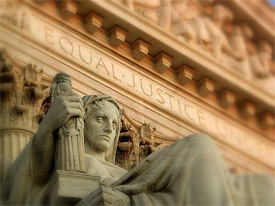Marcy noted briefly Monday morning, the Supreme Court granted certiorari in Clapper v. Amnesty International:
SCOTUS did, however, grant cert to Clapper v. Amnesty, which I wrote about here and here. On its face, Clapper is just about the FISA Amendments Act. But it also has implications for wiretap exceptions–and, I’ve argued–data mining exceptions to the Fourth Amendment. In any case, SCOTUS seems interested in reversing the 2nd Circuit opinion, which had granted standing to people whose work had been chilled by the passage of the FAA. Also, as I hope to note further today, SCOTUS’ Clapper decision may also impact the Hedges v. Obama ruling from last week.
As Marcy indicated, there is nothing good afoot from SCOTUS taking cert in Clapper; if they wanted to leave the very nice decision of the 2nd Circuit intact, they simply leave it intact and don’t grant review. Oh, and, yes, Marcy is quite right, it’s a very safe bet that Clapper will “impact” the also very nice recent decision in Hedges, which is, itself, headed with a bullet to the 2nd Circuit.
There was, of course, much discussion of the significance of the Clapper cert grant yesterday on Twitter; one of the best of which was between Marcy, Lawfare’s Steve Vladeck and, to a lesser extent, me. To make a long story a little shorter, I said (here and here):
See, and I HATE saying this, I think Kennedy will do just that+then same 5 will kill al-Haramain once it gets to SCOTUS and then they will have capped the Bush wiretapping well completely and closed off standing significantly for the future.
Yikes, I did not contemplate just how true this statement was; the Clapper cert grant has already had a far deeper and more pernicious effect than even I suspected. This morning, in a move I do not believe anybody else has caught on to yet, the 9th Circuit quietly removed both al-Haramain and the CCR case encaptioned In Re: NSA Telecommunications Litigation/CCR v. Obama from the oral argument calendar that has long been set for June 1 in the old 9th Circuit Pasadena courthouse. The orders for both al-Haramain and CCR are identical, here is the language from the al-Haramain one:
Argument in this case scheduled for June 1, 2012 in Pasadena, California, is vacated pending the Supreme Court’s decision in Clapper v. Amnesty Int’l, No. 11- 1025. The court may order supplemental briefing following the Supreme Court’s decision. Oral argument will be rescheduled.
Whoa. This is extremely significant, and extremely unfortunate. Also fairly inexplicable. Entering the order for CCR makes some sense, since it involves the same “fear of surveillance” standing issue as is at issue in Clapper; but doing it for al-Haramain makes no sense whatsoever, because al-Haramain is an “actual” surveillance standing case.
There simply is no issue of the claimed, putative, standing concern that permeates Clapper and CCR. Well, not unless the 9th Circuit panel thinks the Supreme Court might speak more broadly, and expand the parameters wildly, in Clapper just as they did in Citizens United. That would be a pretty ugly path for the Supreme beings to follow; but, apparently, not just a cynical bet on my part, but also a bet the 9th Circuit immediately placed as well.
To be fair, even positive forward thinking players, like Steve Vladeck, thought the lower courts might be copacetic, or that the Supremes might comply. Maybe not so much. I know, shocking. Here is a glimpse, through Vladeck, of the situation:
But at a more fundamental level, there’s one more point worth making: Readers are likely familiar with Alex Bickel’s Passive Virtues, and his thesis that, especially on such sensitive questions where constitutional rights intersect with national security, courts might do best to rely on justiciability doctrines to duck the issue—and to thereby avoid passing upon the merits one way or the other. [Think Joshua at the end of WarGames: “The only winning move is not to play.”] And at first blush, this looks like the perfect case for Bickel’s thesis, given the implications in either direction on the merits: recognizing a foreign intelligence surveillance exception and thereby endorsing such sweeping, warrantless interceptions of previously protected communications vs. removing this particular club from the government’s bag…
And yet, the foreign intelligence surveillance exception only exists because it has already been recognized by a circuit-level federal court, to wit, the FISA Court of Review. Whether the passive virtues might otherwise justify judicial sidestepping in such a contentious case, the fact of the matter is that this is a problem largely (albeit not entirely, thanks to the FISA Amendments Act) of the courts‘ making. To duck at this stage would be to let the FISA Court of Review—the judges of which are selected by the Chief Justice—have the last word on such a momentous question of constitutional law. In my view, at least, that would be unfortunate, and it’s certainly not what Bickel meant…
Back to al-Haramain and the effects in the 9th Circuit. Here is the latest, taken from the Motion for Reconsideration filed late yesterday by al-Haramain, Wendell Belew and Asim Ghafoor:
The question presented in Clapper is thus wholly unrelated to the issues presented on the defendants’ appeal in the present case. The Supreme Court’s decision in Clapper will have no effect on the disposition of the present case. Thus, there is no reason to delay the adjudication of this appeal pending the decision in Clapper, which would only add another year or more to the six-plus years that this case has been in litigation.
It makes sense for the Court to have vacated the oral argument date for Center for Constitutional Rights v. Obama, No. 11-15956, which involves theories of Article III standing similar to those in Clapper. It does not, however, make sense in the present case, where Article III standing is based on proof of actual past surveillance rather than the fear of future surveillance and expenditures to protect communications asserted in Clapper.
Yes, that is exactly correct.
And, therein, resides the problem with Vladeck’s interpretation of what is going on with the Clapper case. Steve undersold, severely, just how problematic Clapper is. Both the discussion herein, and the knee jerk action of the 9th Circuit, the alleged liberal scourge of Democratic Federal Appellate Courts, demonstrate how critical this all is and why Clapper is so important.
Clapper has not only consumed its own oxygen, it has consumed that of independent, and important, nee critical, elements of the only reductive cases there are left in the United States judicial system in regards to these ends. That would be, at an irreducible minimum, al-Haramain in the 9th Circuit.
If you have forgotten about al-Haramain, and the proceedings that took place in the inestimable Vaughn Walker’s, court, here it is. Of all the attempts to attack the Bush/Cheney wiretapping crimes, al-Haramain is the only court case that, due to its unique circumstances, has been successful. It alone stands for the proposition that mass crimes were, in fact, committed. al-Haramain had a tough enough road ahead of it on its own, the road has become all the more treacherous now because of Clapper.
The 9th Circuit should grant the motion for reconsideration and reinstate al-Haramain on the oral argument calendar, but that is quite likely a longshot at this point. Expect the DOJ to file a very aggressive response, they are undoubtedly jumping for joy at this stroke of good fortune and will strive to protect it.
 Last night (well for me, early morning by the blog clock) I did a post on the decision in the SDNY case of Hedges et. al v. Obama. It was, save for some extended quotations, a relatively short post that touched perhaps too much on the positive and not enough on the inherent problems that lead me to conclude at the end of the post that the decision’s odds on appeal are dire.
Last night (well for me, early morning by the blog clock) I did a post on the decision in the SDNY case of Hedges et. al v. Obama. It was, save for some extended quotations, a relatively short post that touched perhaps too much on the positive and not enough on the inherent problems that lead me to conclude at the end of the post that the decision’s odds on appeal are dire.






